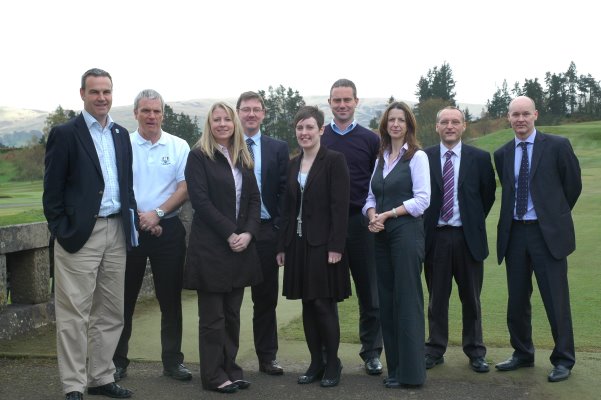
While home golf fans will hope that the predominant colour on the scoreboards of The 2014 Ryder Cup at Gleneagles will be European blue, an exciting initiative is already underway to ensure that the contest on The PGA Centenary Course from 26-28 September, 2014, will also celebrate green.
The 2014 Ryder Cup Green Drive – coordinated by Ryder Cup Europe (RCE) and the Golf Environment Organization (GEO) – and featuring a steering group that also includes EventScotland, Scottish Government, Zero Waste Scotland, the Scottish Golf Union, Perth and Kinross Council and Scottish Natural Heritage – sets out to integrate sustainability into all aspects of event planning, staging and legacy.
Building on the previous Green Drive initiative that was undertaken at The 2010 Ryder Cup at The Celtic Manor Resort in Wales, the 2014 programme will continue The Ryder Cup’s leadership by setting out even more ambitious plans for one of the world’s most visible sporting events.
Speaking at the announcement of the initiative at The Gleneagles Hotel, Edward Kitson, Ryder Cup Match Director, said: “After the success in Wales we are genuinely excited by the prospect of what we and our partners can achieve as the event returns to the home of golf in 2014.
“We are delighted to extend our long-standing partnership with the Golf Environment Organization – and their knowledge and experience has helped us greatly in integrating sustainability across all aspects of staging.
“We are currently putting in place the building blocks that will enable us to minimize and mitigate the event’s unavoidable impacts, and also look at many new ways to maximize positive opportunities to outreach, advocate and engage for a lasting legacy.”
Sports Minister Shona Robison added: “2014 is a huge year for sport in Scotland and the Scottish Government is delighted to support the 2014 Ryder Cup Green Drive. This is an opportunity to connect our policies on sustainable development, green energy, biodiversity and waste with a global sporting event that can raise awareness domestically and internationally.”
Robbie Clyde, Ryder Cup Project Director for EventScotland added his support: “Sustainability is an important pillar of EventScotland’s work, and is the reason we supported the development of the Sustainable Sport Event Toolkit (SSET),” he said. “To see the practical application of that here in Scotland, at such a significant world renowned event, is incredibly rewarding.”
Jonathan Smith, GEO Chief Executive, commented: “We’ve got top level backing, a really solid plan, plenty of experience and creative ideas around the table, lots of solutions to apply and a wonderful vehicle to communicate all our collective and individual efforts. We relish the prospect as a flagship project amongst our wider dedicated work to support and promote sustainability in golf, and we look forward to sharing the outcomes with the ever growing number of people and organisations that are Driving the Green in and through golf.”
Scott Fenwick, Gleneagles’ Golf Courses and Estate Manager said: “This initiative fits very well with our proven track record of environmental management and community engagement. Having employed professional sustainability and environmental managers for over a decade we feel well placed to contribute. We look forward to identifying new opportunities across the Resort’s operations, and raising our own performance further in line with the Green Drive.”
Hamish Grey, Chief Executive of the Scottish Golf Union, said: “Ever since the mid 1990‘s, when we became the first Golf Union in the world to employ a full time Environmental Adviser, the SGU has continuously promoted sustainable practices in golf club and course management. We’re delighted to be inputting our knowledge and experience, and look forward to carrying the messages out to the 580 clubs across the country.”
Marissa Lippiatt, Zero Waste Scotland said: “We’re delighted to be working with Ryder Cup to help lead the way in ensuring that Scottish golfing events focus on sustainability and improved resource efficiency. Measures like this aren’t just great for the environment, but also cut costs and lead to enhanced competitive advantage. This steering group offers an example of good practice in waste minimisation and waste management which can be replicated throughout the industry to reduce waste generated by golfing events in the long term, and ultimately help us move towards our goal of zero waste inScotland.”
European Tour www.europeantour.com
Golf Environment Organization www.golfenvironment.org

